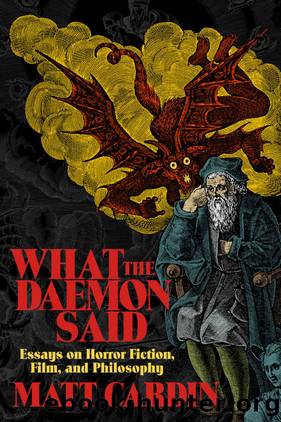What the Daemon Said by Cardin Matt

Author:Cardin, Matt
Language: eng
Format: epub
Publisher: Hippocampus Press
Published: 2022-05-12T00:00:00+00:00
Religion and Vampires
I. Introduction: An Intrinsically Religious Monster
For a ready indication of the profound interconnectedness between the subject of religion and the subject of vampires, one has only to look to the fact that four of the towering figures in the field of vampire studies have also been formidable presences in the field of religion.
The first of these, Augustin Calmet (1672â1757), was a renowned French Benedictine abbot and theologian who may have ranked as the eighteenth centuryâs pre-eminent Catholic biblical scholar. He is best remembered for having written a masterful treatise on vampiresâTraité sur les apparitions des esprits, et sur les vampires . . . (Paris, 1746), translated into English in 1850 as The Phantom Worldâin response to the vampire hysteria that swept across Central and Eastern Europe in the 1720s and 1730s.
The second, Montague Summers (1880â1948), was a colorful British eccentric who achieved the reputation of being the worldâs greatest vampire scholar for his books The Vampire: His Kith and Kin (1928) and The Vampire in Europe (1929). He also claimed to be a Roman Catholic priest, although this was almost certainly a pose that he employed to enhance his mystique as a vampire expert. But he was, in fact, an ordained deacon in the Church of England (according to Father Brocard Sewell in his memoir of Summers) and thus formally bore the Christian title âreverend.â In any event, Raymond T. McNally, in his 1974 anthology of vampirana, A Clutch of Vampires (published by the New York Graphic Society), drew an overt connection between Calmetâs and Summersâs religious credentials and their canonical status in the field of vampire studies by identifying them as âthe only major researchers in this fieldâ and referring to them in the bookâs dedication as âholy fathers in the Christian faith and the spiritual fathers of all latter-day vampirologistsâ (9, 5).
The second, Antoine Faivre (b. 1934), was called out as âthe father of contemporary vampire studiesâ by the Italian sociologist of religion Massimo Introvigne in his 2001 essay titled, appropriately enough, âAntoine Faivre: Father of Contemporary Vampire Studies.â Introvigne asserted that Faivre, an eminent French scholar of religion and esotericism, âopened up and established the field of vampire studies as an independent and relevant academic disciplineâ with his Les Vampires: Essai historique, critique et littéraire by âproving that the vampire controversy was historically significant as the last great European theological and philosophical discussion of magicâ (610).
The fourth figure, J. Gordon Melton, is a prominent American scholar of religious studies who, in addition to founding the Institute for the Study of American Religion and creating Meltonâs Encyclopedia of American Religionsâwhich has gone through multiple editions and is widely regarded as the standard general reference work in its fieldâis also a leading authority on vampires whose scholarly areas of specialization include parapsychology and the occult. His 1994 opus The Vampire Book: The Encyclopedia of the Undead is arguably the most comprehensive English-language reference work in the field of vampire studies, and he has also published a comprehensive bibliography of vampires in folklore, history, literature, film, and television.
Download
This site does not store any files on its server. We only index and link to content provided by other sites. Please contact the content providers to delete copyright contents if any and email us, we'll remove relevant links or contents immediately.
The Power of Myth by Joseph Campbell & Bill Moyers(680)
Four Shakespearean Period Pieces by Margreta de Grazia(661)
A Social History of the Media by Peter Burke & Peter Burke(640)
Inseparable by Emma Donoghue(609)
The Complete Correspondence 1928-1940 by Theodor W. Adorno & Walter Benjamin(509)
Bodies from the Library 3 by Tony Medawar(487)
The Spike by Mark Humphries;(466)
Culture by Terry Eagleton(465)
A Theory of Narrative Drawing by Simon Grennan(460)
World Philology by(452)
Farnsworth's Classical English Rhetoric by Ward Farnsworth(444)
Ideology by Eagleton Terry;(443)
A Reader’s Companion to J. D. Salinger’s The Catcher in the Rye by Peter Beidler(431)
Adam Smith by Jonathan Conlin(425)
Comic Genius: Portraits of Funny People by(410)
Monkey King by Wu Cheng'en(403)
Game of Thrones and Philosophy by William Irwin(399)
High Albania by M. Edith Durham(398)
Early Departures by Justin A. Reynolds(383)
